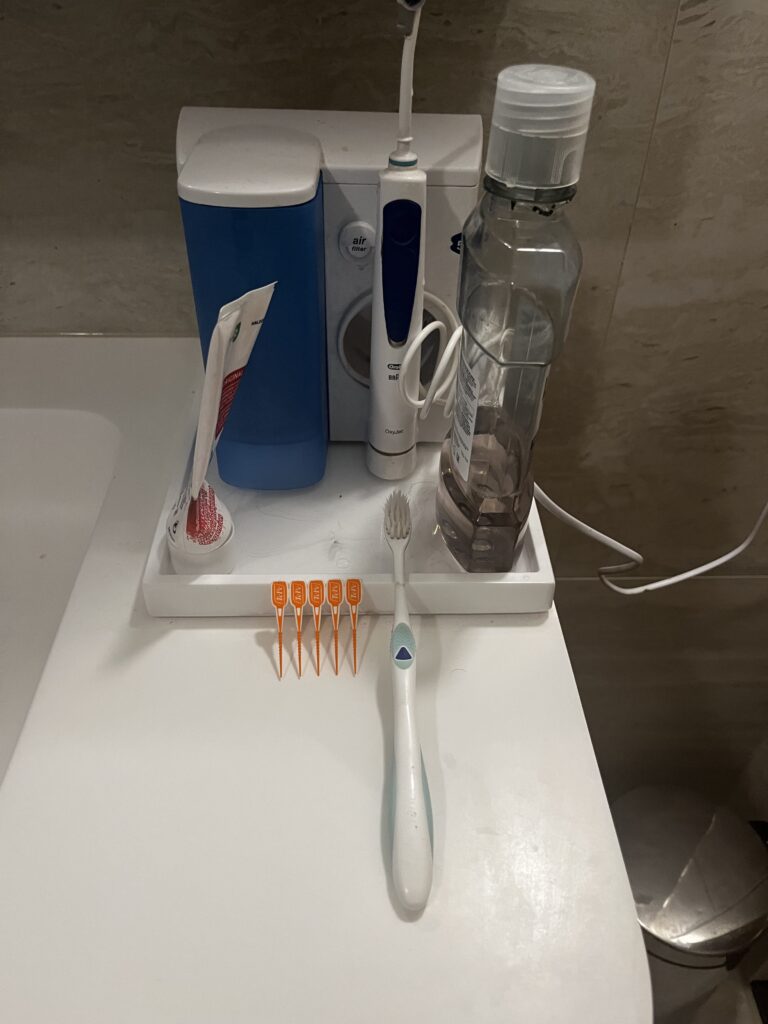
divi divi trees on an Aruba beach
Summary: Proper oral hygiene, particularly aimed at preventing gum disease (“periodontitis“), is a crucial but underestimated factor in promoting longevity. Improving and maintaining good oral hygiene will add years to your life.
1. Strong Connection to Longevity
Surprisingly few longevity experts emphasize the importance of oral hygiene. It is one of the most underestimated, neglected and easy roads to a better health.
Bacteria entering your mouth can affect the health of your entire body. This is especially true if you have bleeding gums. Your heart, brain, lungs, and blood vessels are particularly vulnerable. Hence, good oral hygiene promotes healthy gums which is much more than just a hygiene measure for your mouth.
Some claim that proper oral hygiene can add up to seven years to your life. Normally such claims makes me smile, because if you add up all claims—from coffee, chocolate, exercise, etc.—one will life up to 200 years. Of course, it does not work this way, as health is a complex system. You can’t isolate one action’s effects from others. Good oral hygiene is very beneficial, but….on its own it will not save those with unhealthy lifestyles.
It is impossible to quantify how much lifespan is attributable solely to good oral hygiene. A holistic health approach, including good oral care, regular exercise, balanced nutrition, stress management, and routine medical check-ups, is crucial. It is difficult to pinpoint exact lifespan extensions. However, the positive effects of good oral health contribute significantly to a potentially longer life. This last point seems sure to me. Being an optimist I want to believe those who say the difference might be seven years.
2. Can we reverse the effects of poor oral hygiene?
It’s perhaps difficult to reverse all structural damage from poor oral hygiene. However, timely action can often improve the situation. Consistent effort contributes to improvement as well. By adopting healthy habits like brushing, flossing, and consuming a balanced diet, you can protect your teeth and gums. Visit your dentist regularly and keep a healthy lifestyle.
3. Benefits of good oral hygiene
a. There’s a well-established link between oral health and heart health. Gum disease has been linked to increased heart disease risk, as oral bacteria-induced inflammation leads to “atherosclerosis” (artery hardening).
b. Good oral health helps regulate blood sugar levels, while gum disease complicates blood sugar control.
c. Good oral hygiene reduces infection risks. One such risk is “endocarditis,” an infection of the heart lining. This infection is caused by mouth bacteria entering the bloodstream.
d. Healthy gums reduce tooth loss risk, impacting nutrition and quality of life, especially for older adults.
e. Oral health impacts self-esteem, communication, social life, and even better kissing““`.
4. More about Periodontal Disease
Stage 1. Food particles and bacteria form plaque. This can lead to early gum disease known as “gingivitis” if not removed through brushing and flossing. Harmful bacteria can enter the bloodstream. Which they do!
Stage 2. Over time, plaque hardens into tartar, which only a dentist can remove professionally.
Stage 3. Prolonged tartar leads to periodontitis.
According to the CDC, 47% of adults over 30 and 70% over 65 in the USA have periodontal disease. It is more common in men and smokers.
5. Periodontitis and Alzheimer’s Disease
Studies suggest a potential strong link between periodontal disease and Alzheimer’s disease, highlighting the importance of serious oral hygiene practices.
6. Spending more time caring for oral hygiene/what I do
Speaking of ‘time in the bathroom‘, men generally spend much less time in bathrooms than women. I used to spend a limit of 10 minutes daily, but I’ve changed my routine. I now dedicate two longer sessions to tooth care and two sessions for skincare (a future blog topic). My routine (see picture below) includes a water flos machine, modern plastic toothpicks, brushing, and mouthwash. I do this once in the morning and once after dinner. Additionally, I carry out brief cleanings and I also take the occasional chewing gum during the day.

4. Toothbrush care: friend and foe
Toothbrushes wear out, so replacements are necessary every three months. Additionally, they easily harbor bacteria. I disinfect my toothbrush weekly by filling a clean cup with water. I add a splash of lemon juice and a spoonful of baking soda (sodium bicarbonate). Baking soda is available at drugstores.
On this note I wish you good flossing and brushing,
Robert, your health friend

A parador in Caceres, Spain







